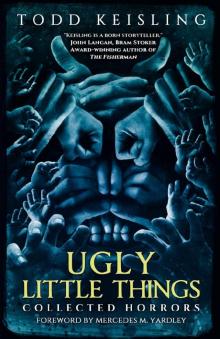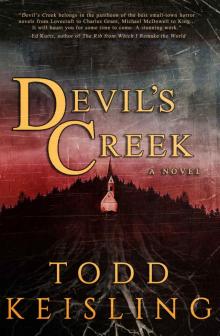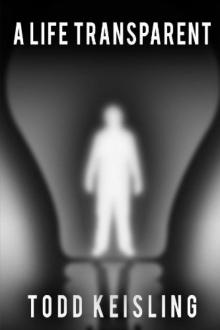- Home
- Todd Keisling
A Life Transparent Page 2
A Life Transparent Read online
Page 2
Just smile, he told himself. It wasn’t that simple. When Donovan did not respond, Butler repeated himself. Donovan closed his eyes for a moment. His name was Donovan Candle. Not just “Candle.” Butler’s insistence on dropping a person’s first name was grating on even the best of days. Donovan tried to maintain his composure.
“Morning,” he said. He poured cream and sugar into his coffee.
“How was your weekend, Candle? Mine was great—”
Oh really? How great was it?
Timothy Butler yammered on. For Donovan, knowing his boss spoke only to hear his own voice made his presence all the more intolerable.
The discomfort in his stomach returned with force, startling him so badly that he almost dropped his mug. A few drops of coffee spilled onto the counter. Butler’s words—something about a weekend, a lake, time on a boat with his wife—ran together, and for a few agonizing seconds, all Donovan could hear was a low, metallic drone.
What the hell is happening to me?
The feeling ceased. Butler was still talking. Donovan put a hand to his forehead, and it came away slick with sweat.
“—played eighteen holes after we got home from the beach on Sund—”
Donovan knew this conversation, had heard it a thousand times before. He’d seen others caught in this same corner, forced to listen to Butler’s monologue about weekend excursions, and now it was his turn again. After nine years Donovan had learned to tune him out.
He stirred his coffee. The sensation swelled in the pit of his stomach once more, but only for an instant. Maybe Butler’s sucking the life out of me, he mused. The thought made him smile.
“So, yeah, how was your weekend, Candle?” Butler clapped a hand on Donovan’s back, causing him to spill a few more drops of coffee, this time onto his shoes. He looked into his boss’ cold, blue eyes and forced a smile.
“It was a weekend.”
Staring into his superior’s face, Donovan was reminded of how little he’d accomplished—how, after nine years, he’d advanced only one or two rungs up the corporate ladder. Timothy Butler, only a few years older, had a much higher salary and a more fulfilling life. Would these things be Donovan’s in the years to come?
Yes, he told himself. He wanted the extravagant stories and financial freedom. He wanted that new TV, he wanted to buy Donna that jewelry she’d had her eye on, he wanted to finish that novel. He wanted to remodel the guest room, to have a child, to build a legacy and pass it on.
He wanted life with all its trimmings. Staring into Butler’s eyes, he realized he’d have to work harder, to toil and reach for that goal. He’d have to want it more than anything else.
“Mr. Butler,” he heard himself say. Butler’s eyes seemed to reflect the sparkle of his perfect teeth.
“What’s up, Candle?”
“Just wanted to remind you about my review tomorrow.”
Butler’s expression faded, and for a moment Donovan feared the man had forgotten about his review, but then his face lit up and he said, “Don’t worry, amigo! It’s all taken care of!”
Relief came over him, but it was short-lived. As Timothy Butler walked away, Donovan saw the man’s reassuring facade fall away for an instant. He stood there, not quite sure whether it was his imagination or something more sinister. Butler’s expression seemed so conniving. It made him uneasy, a feeling that followed him back to his desk.
There he finished his coffee and continued working through his lunch hour, making cold calls to customers in an attempt to sell them a service they did not want. As the hours crawled by, he found he was unable to escape the black cloud of Butler’s mysterious expression. All afternoon, he struggled to determine just what it was that worried him.
Was it that he did not trust his own boss? Was it the insincerity in Butler’s eyes that put him on edge? He thought about asking around the office, but that would only lead to gossip, and this would be better played close to the chest. Even so, uncertainty nagged him. It encompassed his mind so completely, that he almost missed the clock striking 5:00 P.M. The entire day was lost to an odd hint of suspicion.
He felt like a failure when he left the office. His sales for the day were the lowest in months. People under his wing—even new hires still in training—had made more sales that day. Donovan had no one to blame but himself. He wanted to blame Timothy Butler, but his rational self spoke too loudly to be ignored. It’s all you, it told him. Quit worrying and get on with it.
Donovan sat in his car for a few minutes, waiting for the emptiness to subside. When it did, he felt the first pangs of hunger rumbling in his stomach, accenting that deeper, more troubling sensation. He tried to ignore it.
Traffic was less agreeable that evening. Shortly after taking the highway entrance ramp, Donovan found himself sitting bumper-to-bumper with other lost souls trying to get home. He switched on the radio to help pass the time. A recap of the morning’s interview was playing, and this time Donovan caught the name of the book’s author.
“Please welcome Dr. Albert Sparrow—”
Outside, an SUV blared its horn and sped around Donovan’s car. He gripped the steering wheel and tried to focus on the road.
“Thank you,” said Dr. Sparrow.
“I understand you’ve got a new book available?”
“Yes, the title is—”
Donovan chimed in, “A Life Ordinary: A Comprehensive Study in Human Mediocrity.” He snorted at the sound of it. So pretentious.
“Care to give us the gist, Doc?”
“Through my studies, I’ve found that most people live painfully boring lives. We get up, we go to work, we slave away for eight, ten, even twelve hours a day, only to go home and meander for a few more before sleep.”
“Yep,” the host chortled. “Sounds about right.”
“Over the last five years I’ve studied this phenomenal tendency toward the ordinary life. While some of my contemporaries refute my argument, I believe atypical activity is essential for our species to survive.”
“So, what, we should go camping or something every other weekend?”
“Not exactly, for even in such an escape we may confine ourselves to routine. Our failure to recognize these patterns leads to a kind of ennui which—”
“On-what?”
“Ennui. It’s—”
Donovan changed the station. Dr. Albert Sparrow was replaced by the screeching singer of AC/DC. He’d rather listen to this than the boorish ramblings of an overpaid PhD. He tuned out a second helping of the aging rockers. The music was interrupted by a Missing Persons alert for someone named Alice Walenta.
As he listened, that faint, metallic buzzing filled his ears. He grimaced at the sound and switched off the radio to help clear his head. The droning stopped. By the time he pulled into his driveway, he’d forgotten all about the good Dr. Sparrow, AC/DC, and Timothy Butler. For a day begun with such high hopes, it had fallen far below the mark.
For now, Donovan was just happy to be home.
• • •
“So, I was wondering ...”
Donna dabbed the corners of her mouth with a napkin. Steam from a platter of broiled chicken rose between them.
“Uh huh?” he mumbled between bites.
“I was wondering if we could, you know, maybe take a vacation?”
“A vacation?”
“Not for a week or anything. Just, I don’t know, a long weekend?”
He swallowed his chicken, cut another piece, and asked, “When? To where?”
“I don’t know, Don. I thought we could go to the shore. It would be nice.”
Donovan finished his chicken, washed it down with a glass of iced tea, and released a low belch. He excused himself, then stood and walked to the fridge to examine their cat-themed calendar. A kitten-shaped magnet held it to the refrigerator door.
“We could go early next month,” she offered, “before the tourists start to arrive.”
He flipped back and forth between the current month and
the next, frowning. “Honey, I—” he began, but then interrupted himself. “Oh hell.”
“What?”
He held out the calendar page and pointed to a circled date. “Today’s the 16th.”
Donna shrugged. “So?”
“It’s Michael’s birthday.”
Before she could say anything else, he reaffixed the calendar to the fridge door and reached for the wall-mounted phone. He lifted the receiver from its cradle and dialed. Donna sighed and mumbled something. He turned away just as she rose from her seat to begin clearing the table. By the time his brother answered the phone, she was already running water in the sink.
“Hello?”
Donna clanged dishes into the sink basin.
“Mike,” Donovan said. “Happy birthday.”
Michael Candle chuckled. “Oh. Damn, already?”
“Wasn’t sure I’d catch you at home. Figured you’d be out chasing crooks and the like.”
“Ah well, you know me. Always busy.”
Although Donovan grew up reading the work of Raymond Chandler, he never fashioned himself as much of a detective. His brother, on the other hand, eschewed the fiction of their youth and chose to make detective work his career. Donovan admired Michael’s dedication to hard-boiled facts, so it didn’t surprise him when Michael struck out on his own as a licensed private investigator.
Whenever Donovan spoke about his brother, he was always sure to mention Michael’s career as a Private Eye.
Donna turned off the faucet. Dishes clanked together in the sink.
“So ...” his brother said. The lingering tension in his voice made Donovan uncomfortable. “What’s up, Don? How’s life?”
He sucked in his breath. He pictured his brother on the other end of the line, his arms crossed, with a contrived smirk on his face. Their conversations, however innocent, always shifted focus to Donovan’s quality of life. It could only get worse. He cleared his throat and tried to redirect the conversation’s flow.
“Same as usual. Say, have you spoken to the folks lately?”
“Nah. You?”
“A couple weeks ago. They called from Rio.”
“Rio de Janeiro?”
“Yeah. Crazy, isn’t it?”
Their parents always spoke of seeing the world after they retired. Now, with their father’s pension paid out, they decided to make good on their dream. Their travel agent booked a month-long continent hop. Imagining his folks reclining on some white-sanded beach along the Equator made him smile. He glanced over at Donna. He hoped they would be able to travel someday.
His face fell when he remembered her request for a weekend vacation. Maybe they could, but not in the near future. They had to save their money for the baby.
“Don? You there?”
“Huh? Yeah. Sorry, just spaced out for a sec.”
“I asked how the wife’s doing?”
He looked at Donna. He could see the rigid frown on her face as she finished the dishes.
“Donna’s just fine. Feisty as ever.”
She paused for a moment, shot him a quick glance, then splashed her hands back into the dishwater.
“How’s—how’s your girl? Jennifer, right? Any kids yet?”
It was laughable, the thought of Michael having children. He was too wrapped up in his own life to focus on kids. It was astounding that he even had time to date. Donovan hadn’t met Michael’s new girlfriend, but he hoped to soon. From what his brother told him, she seemed lovely, a perfect match.
Michael said, “No, no kids yet.”
“You know, Donna and I are trying. You might be an u—”
“You still a phone jockey?”
Donovan closed his mouth. Uncle, he finished. Thick pockets of heat collected around his face, accenting his shame. The phone’s plastic casing popped, and he realized he was gripping it too hard. That invisible hand began to pull at his midsection again, working its nonexistent fingers around his spine and threatening to pluck him away. Donovan heard a hiss of static, and then it was gone.
He collected himself, measured his words. They came slowly.
“Yes. I still for work Identinel.”
Michael chuckled. Donovan imagined his brother’s smug grin. It was an expression he knew well. While growing up, his brother picked on him for burying himself in his books, mocking his choice to view life through imaginary eyes rather than living in reality. Even now, at the age of thirty-two, Michael’s condescension still pulled at Donovan’s strings. Michael knew this, and that made it even worse.
“You need to live a little, Don.”
“I’m happy with the way things are, Mike.”
It was the same conversation as always. Why did it always come to this?
“No, Donovan,” his brother said, “I don’t think you are. I really don’t. And you want to know why?”
I’m sure you’ll tell me anyway, Donovan thought, biting his lip in silence.
“It’s because you have no life. Not really. You only think you’re happy because that phone jockey job—”
“I’m one of the top salesmen—”
“—Whatever. That job is all you know. You’ve worked there, what, ten years? Twelve?”
“Nine,” Donovan muttered. The phone’s casing popped again. He relaxed his fingers.
“Nine years and you’re a top salesman. I thought you wanted to write, Don. What happened to that book you were working on?”
He sighed. Every damn time. It always turned into a bickering contest, revolving around how his older brother thought he should live his life. There was always that air of elitism hanging over every conversation, about how Donovan wasn’t living up to his expectations, how he was letting himself and his wife down by not reaching his potential.
Donovan frowned. Somehow, he thought, Michael’s always been happier. Always more successful. It was true. Once Michael knew what he wanted, he went after it, not stopping until it was his. Donovan, on the other hand, meandered. He wasn’t sure what he wanted. As the years slipped by, he chose the path of least resistance, and now he was frowned upon for swimming with the current. Perhaps that was what he didn’t understand: how someone who went against the grain could be so successful, while he—the more compliant of the two—remained static.
“Go out, Don. Take Donna and just go somewhere. Do something, don’t just plan it. Pick up your shit and go, man. Otherwise you’re just living in a box while the world moves on without you.”
“I can’t afford to,” he snapped. His voice was shaky, eyes watering, and a lump had lodged itself in his throat. Worse, the weird indigestion kept coming back. Sweat dotted his forehead. In the span of the last five minutes he was reduced to a bullied six year-old all over again.
“And that’s because—”
“Look,” he said, “I’m sorry I didn’t live up to your expectations. I’m sorry I don’t live the glamorous lifestyle, Mr. Private Dick. My job is my job and it pays my bills.”
“It pays your bills,” Michael countered, “and that’s all. To top it off, your job is sucking the life out of you one day at a time.”
“No.” It was a weak reply. He slammed one hand against the refrigerator door. It startled Donna, and she dropped a plate into the sink. “It’s just a job. I’m still working on that novel. One day soon—”
Michael sighed. “Y’know what I want for my birthday, little brother?”
“What?”
“For you to get a fucking life.”
He scrambled for a retort, could even feel it climbing up the back of his throat, warm and boiling with venom—
But the line was dead. The dial tone hummed in his ear. He hung up the phone and turned. Donna leaned against the counter with her arms folded across her chest and a damp dish towel hanging over shoulder.
“How’s your brother?”
Donovan stared at her, noting the slant of her lips and the glint in her eyes. He knew that look. He knew he should choose his words carefully, with little hesitation.
“He’s an asshole.”
“What did he say?”
“Same old crap about how I should find another job, how I’m not really living, blah, blah, blah.”
He twirled one finger in the air. Mr. Precious Paws pranced into the room and rubbed against his leg. He knelt, picked up the cat, and scratched between his ears.
Donna frowned. She turned back to the sink, reached into its murky water, and pulled the plug.
Donovan said nothing. He kept scratching the cat between his ears. The dishwater gurgled as it went down the drain, and he cleared his throat when it finished.
“So, about that vacation.”
“Just forget I said anything, Don.”
There it was. The tone. It grated down his spine.
“Honey, you know we can’t—”
“And why not?” She tossed the dish towel onto the counter.
“We can’t afford it.”
“We can afford it.” She turned to face him. “I’m not sure what your brother said to you, but I’ve got a pretty good idea.”
She counted off details of their conversation with her fingers. “He probably asked you about your job. He asked how long you’ve worked there—”
He smirked. “You’re pretty good at this.”
“—and how you’ve not done anything with your life because you don’t have one. Am I right? Am I in the ballpark, Donovan?”
His face fell. His mouth was dry. Donna shook her head.
“If you don’t want to go, just tell me. Don’t give me the same excuse as everything else. We can afford it, Don. I can check the savings account too, you know.”
He chewed his lower lip. “But we have to save for the baby, Donna.”
“I just—” She stammered. “I just want to do something with our lives, Don. It’s always save, save, save, and for what?” She paused, held back a sob, and said, “It’s not about the money. You know that. We don’t have to stay at a five-star resort. I would be happy just driving to the shore for a day, but you won’t let me finish. You’ve already made up your mind.”
The first tears streamed down her cheeks.

 Ugly Little Things
Ugly Little Things Devil's Creek
Devil's Creek Journals of Horror: Found Fiction
Journals of Horror: Found Fiction A Life Transparent
A Life Transparent The Final Reconciliation
The Final Reconciliation